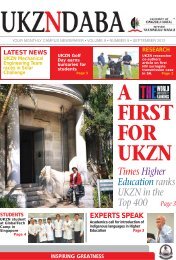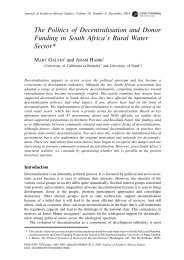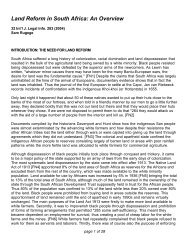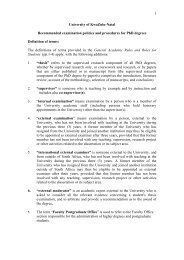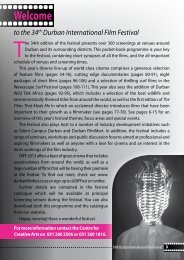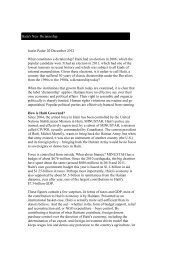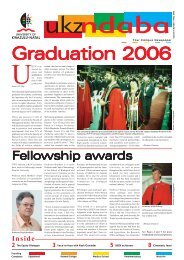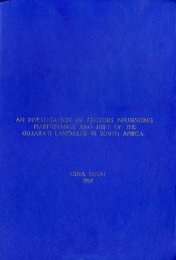universit y of kw azulu-na tal research repor t 2008/2009 - UKZN ...
universit y of kw azulu-na tal research repor t 2008/2009 - UKZN ...
universit y of kw azulu-na tal research repor t 2008/2009 - UKZN ...
- No tags were found...
You also want an ePaper? Increase the reach of your titles
YUMPU automatically turns print PDFs into web optimized ePapers that Google loves.
nrf P-rateD reSearcherNRF P-rated <strong>research</strong>ers are “young <strong>research</strong>ers (normally younger than 35 years <strong>of</strong> age), who haveheld the doctorate or equivalent qualification for less than five years at the time <strong>of</strong> application andwho, on the basis <strong>of</strong> exceptio<strong>na</strong>l potential demonstrated in their published doctoral work and/or their<strong>research</strong> outputs in their early post-doctoral careers are considered likely to become future leaders intheir field”.Dr Serban ProchesDDLecturer in Biogeography inDr Serban Proches – a SeniorDLecturer in Biogeography inDthe School <strong>of</strong> Environmen<strong>tal</strong>DSciences on the Westville Dcampus – hails fromBucharest, Romania, wherehe studied up to Masterslevel and acquired a goodcommand <strong>of</strong> plant and insectdiversity. Dr Proches movedto Durban in 1999 to study towards a PhD with Dr David Marshall <strong>of</strong>the then University <strong>of</strong> Durban-Westville (UDW)’s Zoology Department,which he completed in 2001.After six years <strong>of</strong> postdoctoral projects in Port Elizabeth withPr<strong>of</strong>essor Richard Cowling and Pr<strong>of</strong>essor Graham Kerley; inStellenbosch with Pr<strong>of</strong>essor Dave Richardson and Pr<strong>of</strong>essor StevenChown, and in Pietermaritzburg with Pr<strong>of</strong>essor Steve Johnson, DrProches returned to Durban in <strong>2008</strong>.He is interested in alien species invasions, plant-insect interactions,global bio-geography and phylogenetic patterns. He has authored50 jour<strong>na</strong>l articles and is an associate editor <strong>of</strong> the Jour<strong>na</strong>l <strong>of</strong>Biogeography.Dr Proches’ most recent projects focus on the region stretchingfrom Port Elizabeth to Maputo in Mozambique (and thus centred inDurban) and recognised as one <strong>of</strong> world’s 34 biodiversity hotspots.The patterns <strong>of</strong> species endemism and diversity in this region canbe used to disentangle the dy<strong>na</strong>mics <strong>of</strong> forest, grassland, thicket andsavan<strong>na</strong> vegetation with climate change, and to inform conservationdecisions. In particular, Dr Proches focuses on weevils (Coleoptera:Curculionidae) associated with plants endemic to this region – asindicators <strong>of</strong> plant persistence and climatic stability.With more than 10 000 species in South Africa and hundreds <strong>of</strong>thousands worldwide, weevils are the most diverse group <strong>of</strong> organismsregio<strong>na</strong>lly and globally, and vary enormously in colour and shape, butare severely understudied in southern Africa. Most <strong>of</strong> the species arespecialists associated with one plant species or a few related species,and cannot survive without large populations <strong>of</strong> their host plants.Several weevil lineages survived over tens <strong>of</strong> millions <strong>of</strong> years in thisregion, some ever since the break-up <strong>of</strong> Gondwa<strong>na</strong>land, but currentlyface threats from insecticide use and unsustai<strong>na</strong>ble plant collection.44 <strong>UKZN</strong> Research Report // <strong>2008</strong>/<strong>2009</strong> <strong>UKZN</strong> Research Report // <strong>2008</strong>/<strong>2009</strong> 45



